Scottish election 2021: What are parties saying two days on?
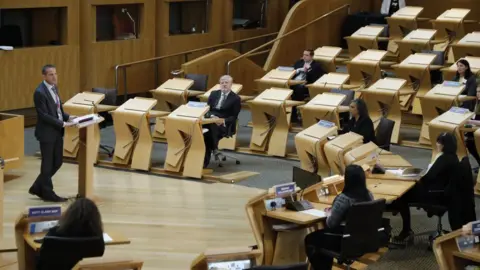 Andrew Cowan
Andrew CowanTwo days after the Holyrood election result was announced, preparations are already under way for the new parliamentary term.
MSPs are being inducted into the Scottish Parliament building on Monday and Tuesday, ahead of a formal swearing-in ceremony on Thursday.
Ahead of that, some of the parties' more experienced politicians have been reflecting on the result.

SNP's John Swinney -'We have to accept what the public have decided'
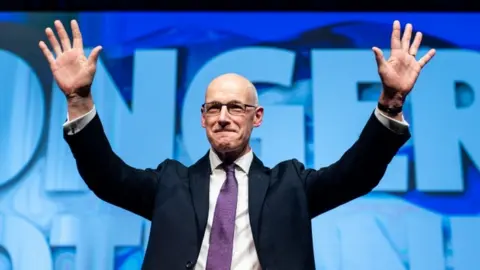 PA Media
PA MediaThe SNP's John Swinney said he was beginning to see signs the UK government was "moving on from the election campaign" and was ready to enter a serious discussion about a second independence referendum.
First Minister Nicola Sturgeon has told Prime Minister Boris Johnson it is a matter of when, not if, such a vote can take place, but has stressed the Covid crisis must have passed.
Mr Swinney, the deputy first minister, said he was heartened to hear Cabinet Office minister Michael Gove telling the BBC on Sunday that the UK government would not challenge any indyref2 legislation in the Supreme Court.
"Michael Gove was also asked 'Can Scotland become independent?' and he answered that question 'yes'," Mr Swinney added. "Once the votes are cast, once the parliament is established, we all have to move on to accept the reality of what the public have decided."
Mr Swinney believes Scotland needs "sustained" suppression of coronavirus before the timing of any indyref2 can be decided, and said there was an aspiration that the pandemic will have passed "in an epidemiological sense" by the end of the year, but he cannot guarantee that.
He added that the country is "moving into a period where Covid becomes much less of an immediate epidemiological threat to the population" and is "very optimistic" ahead of an update on easing of restrictions on Tuesday.
Scottish Conservative Douglas Ross - Two political jobs and new baby on the way
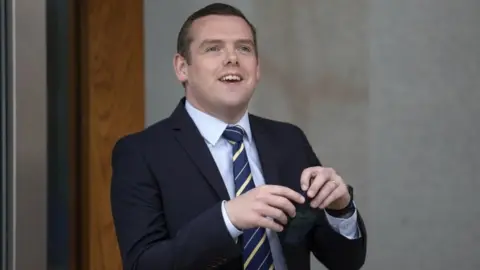 PA Media
PA MediaScottish Conservatives leader Douglas Ross says he has no intention of standing down as an MP, despite returning to Holyrood as an MSP via the Highlands and Islands regional list.
Mr Ross, the MP for Moray since 2017, insists he wants to be a "strong, passionate voice" for Scotland in both parliaments and dismissed concerns others may need to deputise for him in Holyrood if he has to attend votes in Westminster.
"Someone will be standing in for me at FMQs in a few weeks' time anyway because my wife is expecting our second child and I will be taking two weeks' paternity leave," he said.
Mr Ross said a second independence referendum was "not within the powers of the Scottish Parliament" under the Scotland Act, and that people expected politicians to focus on drug deaths, the economy, education and the NHS rather than indyref2.
He said the last year had demonstrated the benefits of "being part of a strong UK", with the furlough scheme, self-employed income support and the vaccination programme all possible "because we are a strong part of a family of four nations".
Mr Ross added that Liz Smith, the Conservative MSP for Mid Scotland and Fife since 2007, would be "an outstanding candidate" to be the new presiding officer to replace Ken Macintosh. "And I'm sure there will be others," he said.
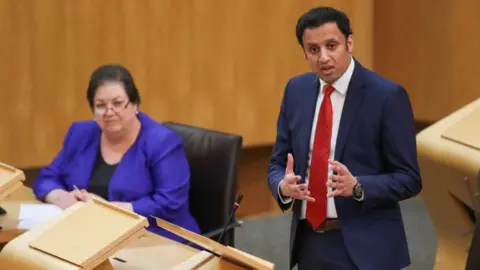 Reuters
ReutersScottish Labour's Jackie Baillie - 'Buoyed by results' despite fall in MSPs
Despite seeing its number of MSPs reduced from 24 to 22, Scottish Labour's deputy leader Jackie Baillie insists her party were "buoyed by the results" of the election.
Ms Baillie maintained new leader Anas Sarwar had "begun the task of rebuilding Labour as an alternative to the SNP" and "gave the party permission to be heard again", highlighting Labour's highest tally of votes in a Holyrood election in a decade.
The long-standing MSP held on to Dumbarton, the most marginal seat in Scotland, with an increased majority, helped by tactical voting by unionists intent on preventing an SNP majority in Holyrood.
"They threw everything they had at Dumbarton, it was their number one target seat but they failed to pick it up," she said.
Ms Baillie refused to say what Labour's position would be on a future indyref2, only that the party had "always supported Scotland's right to choose but the SNP fell short of a majority".
"They may have won more seats than other parties but something like 35% of people didn't vote," she added. "The country is actually deeply divided on this issue."
Scottish Greens' Patrick Harvie - Not ruled out formal coalition with SNP
 PA Media
PA MediaScottish Greens co-leader Patrick Harvie believes the party's record haul of eight MSPs demonstrates a "growing appetite" for taking green politics "to the next level" and turning "rhetoric about world-leading climate targets, just transition, and net-zero into a reality".
The Greens have not ruled out a formal coalition with the SNP, but Mr Harvie said it is up to the new government to reach out to his party.
"No doubt we'll have conversations with a range of parties about the independence referendum bill and a whole host of issues," he said, insisting the Greens would continue to put forward "positive, constructive and realistic" ideas.
"We've done that with a minority government, and we will carry on doing it with whatever form the SNP take forward government in this session."
Mr Harvie believes a second independence referendum "can and should happen" within the next five years, but that it is "reasonable to wait until the public health crisis is properly over" before setting a date.
"The economic recovery phase is one in which we genuinely do need the additional powers," he added, and said if the UK government "only have legal arguments and no political credibility" in blocking indyref2, "that can't hold for long".
Scottish Lib Dem Willie Rennie - No interest in presiding officer role
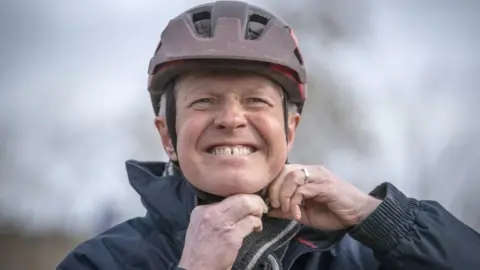 PA Media
PA MediaWillie Rennie believes he is the right man to continue to lead the Scottish Liberal Democrats, despite seeing the party's number of MSPs drop from five to four.
Mr Rennie, who has led the Lib Dems since 2011 and increased his majority in North East Fife with a 55% share of the vote, admitted he had considered his position.
He insisted he had no interest in putting himself forward as Holyrood's new presiding officer, with Ken Macintosh standing down. "It's not a job for me," he said.
Mr Rennie said the party's "biggest challenge, bizarrely" at the election was "to get Liberal Democrat supporters to vote Liberal Democrat", saying supporters came under pressure on the regional list ballot by an "incredibly well funded Conservative campaign".
He brushed aside suggestions the party would find it harder to hold the Scottish government to account, having fallen below the threshold of five MSPs which guarantees a party certain rights, such as committee convenorships and being awarded a weekly question at First Minister's Questions.
"You try to shut us up," he added. "You just watch. In this parliament, the Liberal Democrat voice will be a strong one, it will hold the SNP to account and represent the many thousands who backed us."


